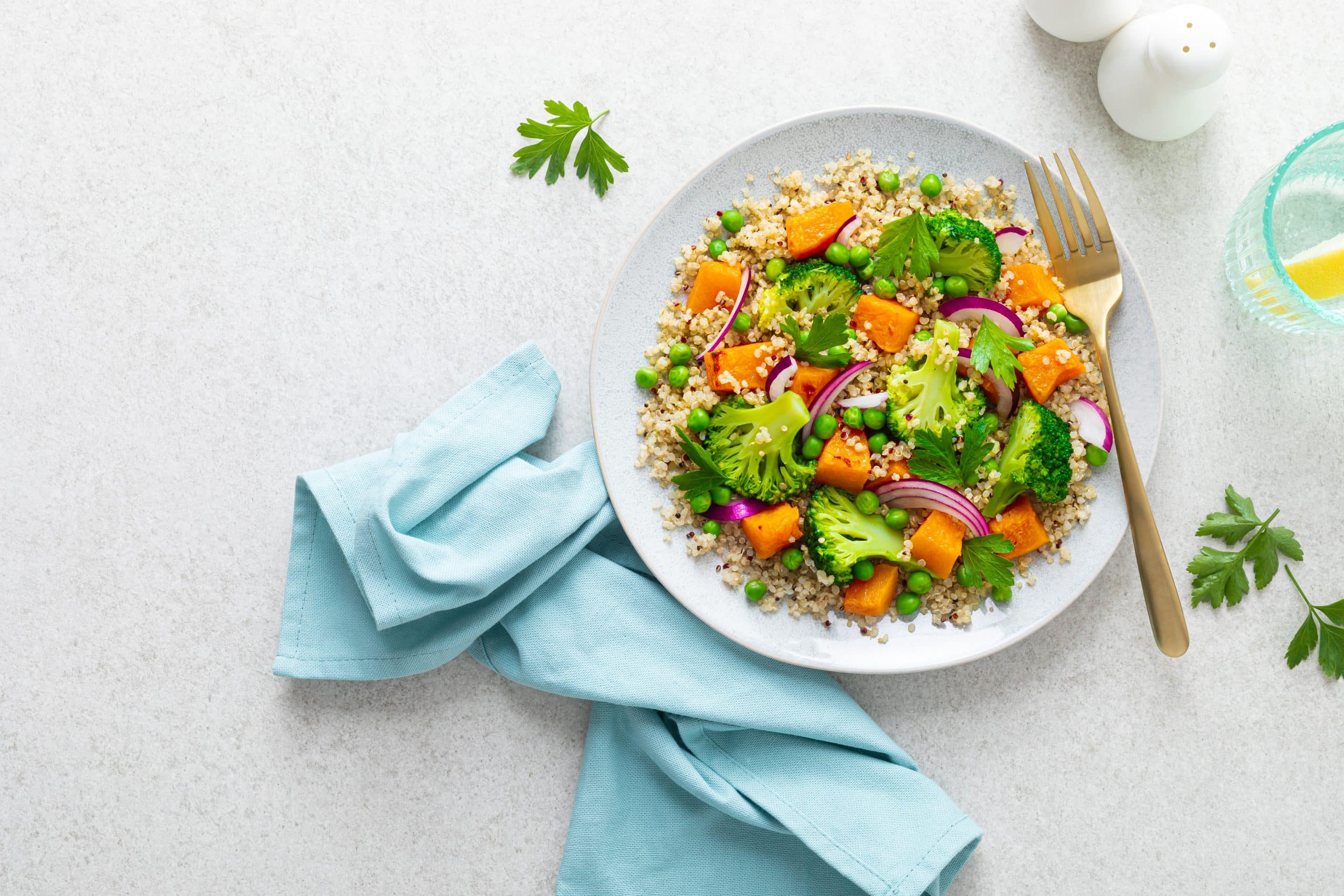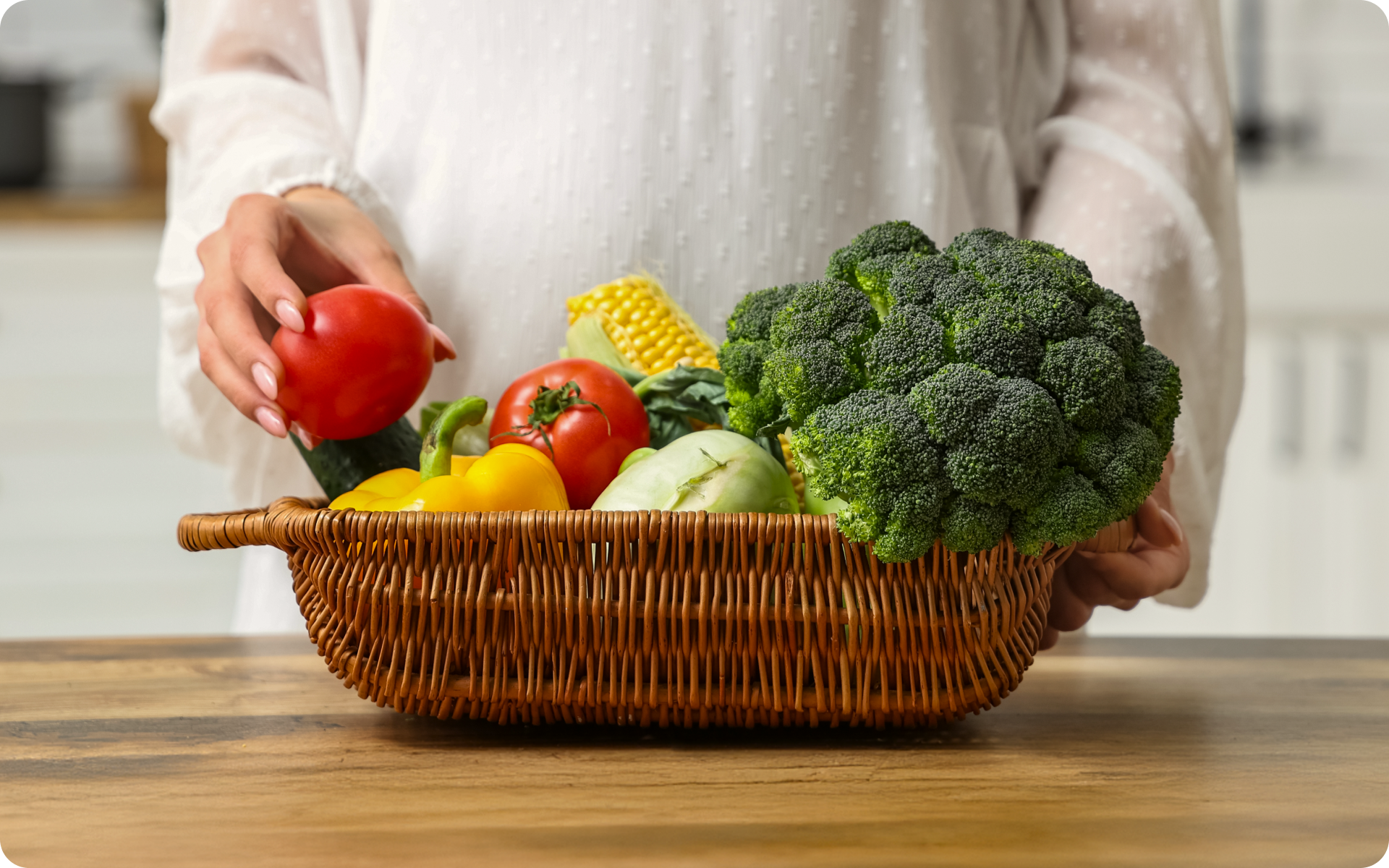Meal planning is the process of organizing and preparing meals in advance, often with specific dietary goals or requirements in mind. It has become an essential practice for many individuals seeking to maintain a healthy lifestyle while juggling busy schedules. For those following a macronutrient-specific diet, such as one that emphasizes high protein intake, meal planning can be particularly helpful to ensure that they efficiently meet their nutritional needs. In this guide we will provide you with an in-depth look at a 1500 calorie meal plan that is rich in protein, which can be beneficial for muscle growth, weight loss, and overall health. By following this comprehensive meal plan, you will be well-equipped to make informed choices about your daily food intake and enjoy a satisfying, high-protein diet without compromising neither on taste nor variety.
Get your personalized
meal plan!
What Is A 1500 Calorie Meal Plan High Protein?
A 1500 calorie meal plan high protein is a dietary plan designed to provide an individual with a daily intake of 1500 calories, with a significant emphasis on protein consumption. This type of meal plan is tailored to meet specific nutritional goals while maintaining a controlled caloric intake.
Calories are units of energy that our bodies require to function properly, and they come from the three primary macronutrients: carbohydrates, proteins, and fats (2).
In a high-protein meal plan, the percentage of daily calories derived from protein is higher than in a standard diet.
Protein is a crucial macronutrient responsible for various functions in the body, including building and repairing muscle tissue, promoting satiety, and supporting various metabolic processes (11).
By increasing the proportion of protein in your diet, you can potentially boost muscle growth, improve weight loss efforts, and enhance overall health (3).
A 1500 calorie meal plan high protein is particularly useful for individuals who are looking to either lose weight, maintain a lean body mass, or support an active lifestyle. This type of meal plan helps strike a balance between providing sufficient nutrients and energy while still promoting a calorie deficit, which is essential for weight loss (6).
Furthermore, a high-protein diet can help preserve muscle mass during weight loss, ensuring that the weight shed comes primarily from fat stores.
Read More: Primal Diet Meal Plan: A Beginner’s Guide
How Much Protein Should I Eat On A 1500-Calorie Diet?
The amount of protein you should consume on a 1500-calorie diet depends on various factors, including your activity level, and specific health goals. Here’s a general guideline to help you determine the appropriate protein intake:
Recommended Dietary Allowance (RDA)
The RDA for protein is 0.8 grams of protein per kilogram of body weight for the average sedentary adult (4). This serves as a baseline recommendation to meet the minimum protein requirements for maintaining overall health.
Active Individuals
If you engage in regular physical activity, especially strength training or endurance sports, your protein needs will be higher. Active individuals typically require 1.4 to 2.0 grams of protein per kilogram of body weight to support muscle growth, repair, and recovery (9).
Weight Loss Goals
When trying to lose weight, a higher protein intake (around 1.2 to 1.6 grams per kilogram of body weight) can help preserve lean muscle mass while at the same time promoting fat loss (16). Consuming more protein also increases satiety, which can help control hunger and reduce overall calorie consumption (12).
Calculating Protein Intake
First, convert your body weight from pounds to kilograms by dividing your weight in pounds by 2.2. Then, multiply your weight in kilograms by the recommended protein intake range (0.8 to 2.0 grams per kilogram) based on your activity level and goals.
Percentage Of Total Calories
Another way to determine your protein intake is to calculate it as a percentage of your total daily calories. In a high-protein diet, calories from protein should account for approximately 25-35% of your total caloric intake. For a 1500-calorie diet, this translates to about 94 to 131 grams of protein per day.
How To Get 150g Protein In 1500 Calories
You might need 150 grams of protein in a 1500-calorie diet if you’re involved in intense strength training, or endurance sports, or have specific health goals such as preserving muscle mass during weight loss.
Consuming this amount of protein may help support muscle growth, repair, and recovery, as well as increase satiety and assist in overall weight management.
To achieve 150 grams of protein within a 1500 calorie diet, follow these strategies:
Choose High-Protein, Low-Calorie Foods
Opt for lean protein sources, such as chicken breast, turkey, fish, egg whites, tofu, and low- or nonfat Greek yogurt. These foods provide a significant amount of protein with fewer calories compared to higher-fat protein sources.
Incorporate Protein-Rich Plant-Based Options
Beans, lentils, chickpeas, tempeh, and edamame are excellent plant-based protein sources that can be easily incorporated into your meals while also providing fiber and other essential nutrients.
Intense sweat sessions, working weight loss tips, lip-smacking recipes come in one package with the BetterMe app. And all of it is at your fingertips, start transforming your life now!
Utilize Protein Powders
Whey, casein, or plant-based protein powders can be an efficient way to boost your protein intake without adding too many calories. Add them to smoothies, oatmeal, or use them in baking recipes to increase the protein content.
Spread Protein Intake Throughout The Day
Consume protein-rich foods at each meal and snack to ensure you consistently meet your daily protein goal. This approach can also help with muscle protein synthesis and keep you feeling full throughout the day.
Monitor Macronutrient Distribution
Since a high-protein intake will account for a significant portion of your daily calories, pay attention to the balance of carbohydrates and fats in your diet. Adjust your consumption of these macronutrients accordingly to stay within the 1500 calorie limit.
Simple 1500 Calorie Meal Plan High Protein
In this section, we’ll provide a variety of high-protein meal plans catering to different dietary preferences. Each easy 1500-calorie meal plan high protein aims to deliver approximately 1500 calories while emphasizing protein intake.
1500 Calorie High Protein Diet Meal Plan
This meal plan is designed for individuals who consume both plant and animal-based protein sources.
- Breakfast: Greek yogurt with berries and a scoop of protein powder (30g protein, 300 calories)
- Lunch: Grilled chicken salad with mixed greens, vegetables, and a light vinaigrette dressing (35g protein, 400 calories)
- Snack: Cottage cheese with sliced cucumber and cherry tomatoes (15g protein, 200 calories)
- Dinner: Baked salmon with steamed broccoli and quinoa (40g protein, 450 calories)
- Snack: Protein shake made with almond milk and a plant-based protein powder (30g protein, 150 calories)
1500 Calorie Meal Plan High Protein Vegetarian
This meal plan focuses on incorporating plant-based protein sources suitable for vegetarians.
- Breakfast: Overnight oats with almond milk, chia seeds, and mixed berries (20g protein, 350 calories)
- Lunch: Lentil salad with mixed greens, vegetables, and a lemon-tahini dressing (25g protein, 400 calories)
- Snack: Greek yogurt with a tablespoon of honey and chopped nuts (15g protein, 200 calories)
- Dinner: Chickpea and vegetable curry served with brown rice (30g protein, 450 calories)
- Snack: Edamame with a sprinkle of sea salt (10g protein, 100 calories)
1500 Calorie Meal Plan High Protein Low Fat Diet
This meal plan emphasizes protein intake while minimizing fat consumption.
- Breakfast: Egg white omelet with spinach, mushrooms, and salsa (25g protein, 250 calories)
- Lunch: Turkey breast wrap with whole wheat tortilla, lettuce, tomato, and mustard (35g protein, 400 calories)
- Snack: Non-fat Greek yogurt with a drizzle of honey and sliced almonds (20g protein, 200 calories)
- Dinner: Grilled white fish with steamed green beans and a side of quinoa (40g protein, 450 calories)
- Snack: Rice cakes topped with low-fat cottage cheese and cherry tomatoes (15g protein, 200 calories)
1500 Calorie 50/30/20 Meal Plan
This meal plan follows a macronutrient distribution of 50% carbohydrates, 30% protein, and 20% fat.
- Breakfast: Protein smoothie with banana, spinach, almond milk, and whey protein powder (30g protein, 375 calories)
- Lunch: Quinoa and black bean salad with avocado, corn, and lime-cilantro dressing (30g protein, 450 calories)
- Snack: Apple slices with 2 tablespoons of natural peanut butter (10g protein, 225 calories)
- Dinner: Baked tofu with roasted vegetables and brown rice (30g protein, 375 calories)
- Snack: Whole wheat toast with mashed avocado and a sprinkle of hemp seeds (10g protein, 75 calories)
1500 Calorie 140g Protein Meal Plan
This meal plan focuses on achieving 140 grams of protein within a 1500 calorie limit.
- Breakfast: Scrambled eggs with spinach and feta cheese (25g protein, 300 calories)
- Lunch: Tuna salad with mixed greens, vegetables, and a light vinaigrette dressing (40g protein, 400 calories)
- Snack: Plain Greek yogurt topped with sliced almonds and a drizzle of honey (20g protein, 200 calories)
- Dinner: Turkey meatballs with marinara sauce served over spaghetti squash (35g protein, 450 calories)
- Snack: Protein shake made with almond milk and a plant-based protein powder (20g protein, 150 calories)
Read More: CICO Diet: How It Works, Its Benefits, Risks, And Meal Plan Ideas
Is A 1500 Calorie Diet Realistic?
A 1500 calorie diet can be realistic for some individuals, depending on their specific needs and circumstances. Factors such as age, gender, weight, height, activity level, and overall health goals play a crucial role in determining the appropriate daily caloric intake for each person.
For sedentary or lightly active individuals, particularly women and older adults, a 1500 calorie diet may be suitable for maintaining or losing weight. However, for more active individuals, especially men and younger adults, this caloric intake might be too low to sustain their energy levels and meet their nutritional requirements.
Remember that a one-size-fits-all approach to caloric intake isn’t effective. Each individual’s needs are unique, and a tailored approach is necessary to ensure optimal health and well-being.
How Much Weight Will I Lose If I Eat 1500 Calories A Day?
The amount of weight you will lose by consuming 1500 calories a day depends on several factors, including your current weight, age, gender, height, activity level, and metabolic rate.
Individual results will vary, and weight loss is not solely determined by caloric intake but also influenced by other factors.
To estimate potential weight loss, you’ll need to consider the following:
1. Calorie Deficit
Weight loss occurs when you burn more calories than you consume, creating a calorie deficit. To lose one to two pounds per week of body weight, you typically need to aim for a calorie deficit of 500 to 750 calories per day (17).
2. Current Calorie Expenditure
Calculate your total daily energy expenditure (TDEE) using an online calculator or consult with a registered dietitian. TDEE takes into account your basal metabolic rate (BMR) and your activity level to estimate the number of calories you burn each day.
3. Compare TDEE To 1500 Calories
Subtract 1500 calories from your TDEE to determine your daily calorie deficit. For example, if your TDEE is 2000 calories, then eating 1500 calories per day would create a calorie deficit of 500 calories.
4. Estimate Weekly Weight Loss
If your daily calorie deficit is between 500-750 calories, you might expect to experience weight loss of 1-2 pounds per week.
Keep in mind that these estimations are based on general guidelines and individual results may vary. It’s also important to note that weight loss tends to be faster initially, as individuals often lose water weight in addition to fat.
Over time, weight loss may slow down as your body adjusts to the lower calorie intake and as you lose more weight.
To ensure healthy and sustainable weight loss, it’s recommended to aim for losing 1-2 pounds (0.45-0.9 kg) per week. Rapid weight loss can lead to muscle loss, nutritional deficiencies, and other health issues.
Why Am I Not Losing Weight On 1500 Calories?
If you’re not losing weight while consuming a 1500 calorie diet, it could be due to several reasons, such as inaccuracies in tracking calorie intake, changes in metabolism, or hormonal imbalances.
It’s important to remember that weight loss is a complex process influenced by various factors beyond just caloric intake.
1. Inaccurate Tracking Of Calorie Intake
One common reason for not losing weight is underestimating the number of calories consumed. This can happen when portion sizes are not measured accurately, some food items are forgotten, or the caloric content of certain dishes is miscalculated.
2. Decreased Metabolism
As you lose weight, your basal metabolic rate (BMR) may decrease, which means you burn fewer calories at rest (10). This can make it more challenging to maintain a calorie deficit and continue losing weight.
Whether you’re looking to simply pep up your fitness routine, jazz up your diet with mouth-watering low-calorie recipes or want to get your act together and significantly drop that number on your scale – BetterMe app has got you covered! Improve your body and revamp your life with us!
3. Hormonal Imbalances
Hormones play a crucial role in weight regulation. Alterations in hormones such as thyroid hormones, cortisol, and insulin can impact weight loss efforts (5).
4. Water Retention
Fluctuations in water weight can mask fat loss, making it seem as though you’re not losing weight. Factors such as high sodium intake, dehydration, and hormonal changes can cause temporary water retention (7) (8) .
5. Lack Of Physical Activity
While a calorie-restricted diet can help create a calorie deficit, incorporating regular physical activity can further support weight loss by increasing the number of calories burned (13).
6. Adaptive Thermogenesis
In some cases, the body may respond to prolonged calorie restriction by slowing down its metabolism to conserve energy. This phenomenon, known as adaptive thermogenesis, can make it more difficult to lose weight (1).
7. Inadequate Sleep And Stress
Poor sleep and chronic stress can negatively impact weight loss efforts by affecting hormone levels, appetite regulation, and overall well-being (14) (15).
Conclusion
A 1500 calorie high-protein meal plan can be an effective way to support weight loss, muscle growth, and overall health. By incorporating a variety of lean protein sources and balancing macronutrients, you can achieve your specific health goals.
DISCLAIMER:
This article is intended for general informational purposes only and does not serve to address individual circumstances. It is not a substitute for professional advice or help and should not be relied on for making any kind of decision-making. Any action taken as a direct or indirect result of the information in this article is entirely at your own risk and is your sole responsibility.
BetterMe, its content staff, and its medical advisors accept no responsibility for inaccuracies, errors, misstatements, inconsistencies, or omissions and specifically disclaim any liability, loss or risk, personal, professional or otherwise, which may be incurred as a consequence, directly or indirectly, of the use and/or application of any content.
You should always seek the advice of your physician or other qualified health provider with any questions you may have regarding a medical condition or your specific situation. Never disregard professional medical advice or delay seeking it because of BetterMe content. If you suspect or think you may have a medical emergency, call your doctor.
SOURCES:
- Adaptive thermogenesis in humans (2013, nature.com)
- Calories: Total Macronutrient Intake, Energy Expenditure, and Net Energy Stores (1989, ncbi.nlm.nih.gov)
- Dietary Protein and Muscle Mass: Translating Science to Application and Health Benefit (2019, mdpi.com)
- Dietary protein intake and human health (2016, pubs.rsc.org)
- Endocrine Changes in Obesity (2022, ncbi.nlm.nih.gov)
- Fat loss depends on energy deficit only, independently of the method for weight loss (2007, pubmed.ncbi.nlm.nih.gov)
- Fluid Retention over the Menstrual Cycle: 1-Year Data from the Prospective Ovulation Cohort (2011, hindawi.com)
- Increased salt consumption induces body water conservation and decreases fluid intake (2017, ncbi.nlm.nih.gov)
- International Society of Sports Nutrition Position Stand: protein and exercise (2017, ncbi.nlm.nih.gov)
- Metabolic Consequences of Weight Reduction (2023, ncbi.nlm.nih.gov)
- Physiology, Proteins (2022, ncbi.nlm.nih.gov)
- Protein, weight management, and satiety (2022, sciencedirect.com)
- Role of Physical Activity for Weight Loss and Weight Maintenance (2017, ncbi.nlm.nih.gov)
- Sleep Deprivation: Effects on Weight Loss and Weight Loss Maintenance (2022, mdpi.com)
- Stress and Obesity: Are There More Susceptible Individuals? (2018, link.springer.com)
- The role of protein in weight loss and maintenance (2022, sciencedirect.com)
- What is the required energy deficit per unit weight loss? (2007, nature.com)













